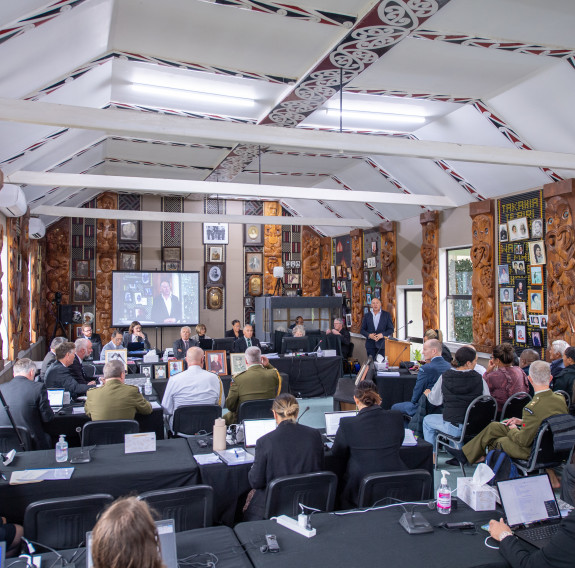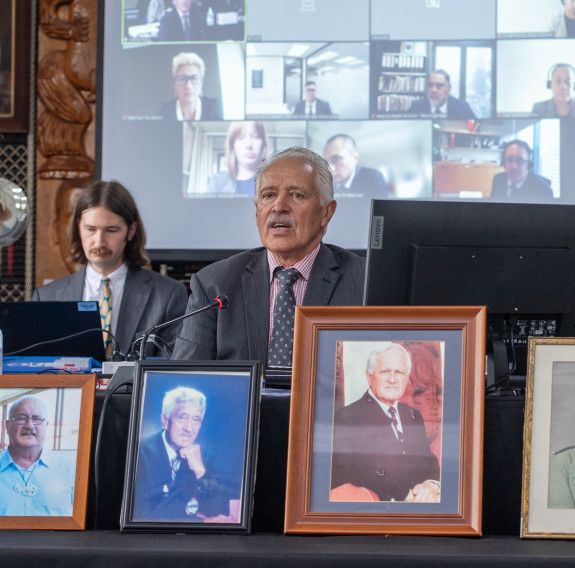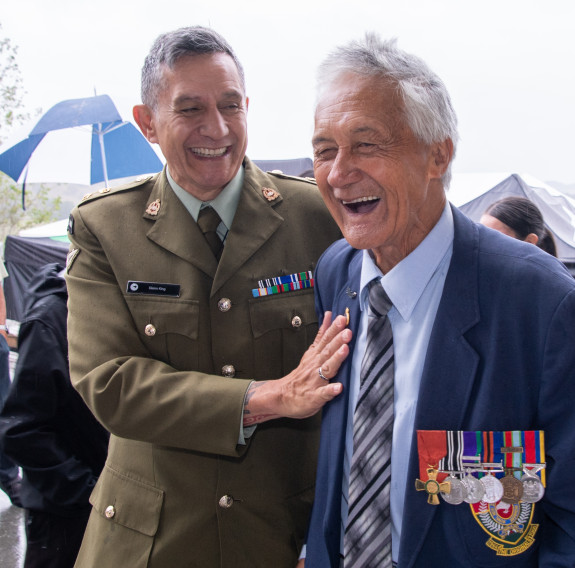Anzac Day 2024
22 April 2024
Unfortunately you are viewing this website on an outdated browser which does not support the necessary features for us to provide an adequate experience. Please switch to a modern browser such as latest version of Google Chrome, Mozilla Firefox, Apple Safari or Microsoft Edge.
Ngā mihi nui
This week marked another important milestone for the New Zealand Defence Force in its journey to better understand the experiences of its Māori veterans.
The latest stage of the Wai 2500 Military Veterans Kaupapa Inquiry saw New Zealand Defence Force (NZDF) personnel travel to Mōtatau Marae in Northland this week, around 40 kilometres south of Waitangi, to hear fresh accounts from Māori veterans and their whanau.
At the pōwhiri, the former Defence Minister Peeni Henare, along with kaumātua from Ngāti Hine, welcomed the Tribunal, senior NZDF leaders and claimants onto Mōtatau Marae grounds on Monday.
Chief of Army, Major General John Boswell and Commander Joint Forces New Zealand, Rear Admiral James Gilmour were among the senior leaders present for the opening day.
They both sat in on the Tribunal hearing and listened to the opening statement from Ngāti Hine, including its legacy of military engagement since the signing of te tiriti o Waitangi, followed by the accounts of Māori veterans and their whānau of their experiences, both good and bad, from their time in military service.
Major General Boswell says it was crucial that the New Zealand Defence Force attended this week’s hearings, and that it actively engages with the Waitangi Tribunal process.
“It’s just incredibly humbling to be here amongst these ex-service personnel,” he said.
Major General Boswell says he was honoured to hear veterans speak with pride about how they served their country, “but also to be exposed to some of the challenges they and their whānau faced.”

Chief of Army, Major General John Boswell and Commander Joint Forces New Zealand, Rear Admiral James Gilmour were among the senior leaders present for the opening day.
This week the Tribunal heard from 20 claimants, broadly focusing on more recent deployments, which have been identified by the Tribunal as the immediate priority in the Kaupapa Inquiry.
These include missions in Malaya, Borneo, Vietnam and South East Asia from the 1950s through to the 1990s, Antarctic operations, nuclear testing in Mururoa, East Timor and the Afghanistan War.
The Tribunal heard briefs from living veterans and their whānau, and from the whānau of deceased veterans.
Their briefs included describing the effects of operational service on the physical and mental health of veterans and the impact their service had on whānau.
They also described their hurt at the lack of support for veterans and their whānau, particularly after they had left the service.
The purpose of the Inquiry, in addition to determining the Treaty of Waitangi consistency of Crown conduct is to prepare an official narrative that will put Maori experiences of military service for the Crown on public record, and consider how to improve our support for veterans, current serving personnel and their whānau.
“It’s crucial that we, the New Zealand Defence Force, support this opportunity for our veterans and their whānau,” says Major General Boswell.
“We’re here to listen and engage with the process so that we can find opportunities to better support our Māori veterans, as well as current serving personnel, now, and into the future.”



This is the second phase of hearings as part of Wai 2500, after the oral evidence was heard in 2016.
It was also the second claimant hearing week of the Kaupapa Inquiry, after the Tribunal met in Rotorua last year.
It will ultimately deliver recommendations to the government on how the NZDF can better serve Māori and on how the NZDF can better implement policies and procedures in line with te ao Māori and te Tiriti o Waitangi.
Alongside the Military Veterans Kaupapa Inquiry, the NZDF is also compiling its own extensive research to get an even more in-depth picture of what experiences Māori servicemen and women have had while serving Aotearoa.
These reports will also add to the growing public record of past Māori military service. A number of reports have already been filed with the Tribunal and are available on the Tribunal website.
The NZDF has also held hui with veterans in order to provide updates on policy shifts within the NZDF as those relate to tikanga and te reo practices, as well as the use of marae and turangawaewae across the services.
“We are proud of the work that’s being done in this space,” says Major General Boswell.
“But what is clear, particularly as it relates to proceedings here this week, we are always learning and looking for opportunities to do things better.
“This is the right thing to do for our people -- to acknowledge our past to inform and improve our future.”
The next claimant hearing of the Wai 2500 Military Veterans Kaupapa Inquiry will occur in Whangārei from 13-17 May 2024.